By Lindsay M. Miller
It’s Saturday night at Raices Brewing Co. in Denver, Colorado, and the brewery is buzzing with music and people. Situated inside a mid-twentieth century bow truss building, its intricate, wooden, arch-shaped ceiling hovers over tables scattered across an open floor plan below. The building, which used to be a car repair facility, still features a garage door in the corner furthest from the entrance. It’s one of the first warm days of spring, so the garage door is open. Plastic chairs and stools turn into wooden benches with comfortable cushions organized around an electric outdoor fireplace. Patrons are seated around the fire and in further, cooler areas of the patio that overlook the Platte River, located just thirty feet below.
Raices is located in the Sun Valley neighborhood, an historically working class Jewish residential neighborhood that, in the 1880s, also included neighborhood retail, factories, farms, markets, a recreation center, and a synagogue.1 Then, when the City of Denver passed its first zoning code in the 1920s, the area was transformed mostly into an industrial zone. Today, one can still see remnants of the neighborhood’s industrial past: a 100-year-old, 65,000 square foot warehouse that served as a rag baling facility sits adjacent to a towering decommissioned former coal, natural gas, and steam plant. A defunct “tank farm” that has stored fuel sits just south of the steam plant, surrounded by brown fields of dead grass. And across the river to the east sits the majority of Sun Valley’s housing: a 1950’s brick row home style public housing project called Sun Valley Homes.
Until its current redevelopment, Sun Valley Homes was home to 333 families, many of whom were refugees and recent immigrants from countries like Somalia, the Republic of Congo, and Vietnam. Until recently, the neighborhood was dubbed “the poorest neighborhood in Denver,” with more than 80 percent of the neighborhood’s residents living in poverty and 85 percent of households consisting of single women and their children.2
Sun Valley is one of the many neighborhoods across the U.S. undergoing major revitalization and redevelopment. In many ways, these neighborhoods are part of one collective narrative, whether they are in Denver, Los Angeles, Atlanta, or Minneapolis. These are the neighborhoods that, through various mechanisms such as redlining, environmental pollution, restrictive covenants, or other mechanisms of systemic racism and classism, experienced major disinvestment throughout the twentieth century. Neighborhoods like Sun Valley have been home to cities’ poorest and most disadvantaged residents, and only recently, due to rapidly growing populations and other housing and development pressures, are these neighborhoods experiencing renewed public and private investment.
This neighborhood change spurred by renewed investment continues to spark considerable debate, particularly as it relates to the impact of redevelopment on a neighborhood’s low-income residents, many of whom are people of color. In response, the challenge many communities face is this: how can they reinvest in areas that need it – creating economic opportunity, improving safety, and increasing access to healthy foods (among other worthwhile goals) without displacing – or erasing – the residents that call these neighborhoods home?
Urban Ventures: A Model for Community-based Real Estate Development
To many local leaders concerned with neighborhood change, “developer” is a bad word. Yet, working with community-oriented developers is one-way local leaders can thoughtfully navigate the growth of historically disadvantaged neighborhoods and encourage thoughtful investment and equitable development.
One Denver-based real estate development company approaches this challenge with thoughtfulness and compassion and engages deeply with the communities in which they develop. Urban Ventures, LLC is a private real estate development company whose mission is “to redevelop urban properties into communities that make a positive contribution to the neighborhood fabric and create sustaining value.” Its projects focus on healthy places, resilient communities, affordable housing, and adaptive reuse, and many are found in Denver’s low-income neighborhoods that are now experiencing rapid change.
Urban Ventures’ projects exemplify community-based, equitable development that balances purpose with profit. Two of these projects are Aria Denver, a mixed-use master-planned community in northwest Denver, and STEAM on the Platte, home to the STEAM office building and Raices brewery, located in the Sun Valley neighborhood. Cities and local leaders can learn much from Urban Ventures’ community-centered approach to real estate development and use their projects as a model for similar redevelopment projects in cities across the U.S.
Aria Denver
Aria Denver is a 17.5-acre master planned community located on the former campus of Marycrest Convent, the home of the Sisters of St. Francis in the Chaffee Park neighborhood of Denver. It is a mixed income, mixed use, and multi-generational community with 526 residential units, 201 of which are affordable. The community was developed through a partnership between Urban Ventures, LLC and affordable housing developer, Perry Rose, LLC.
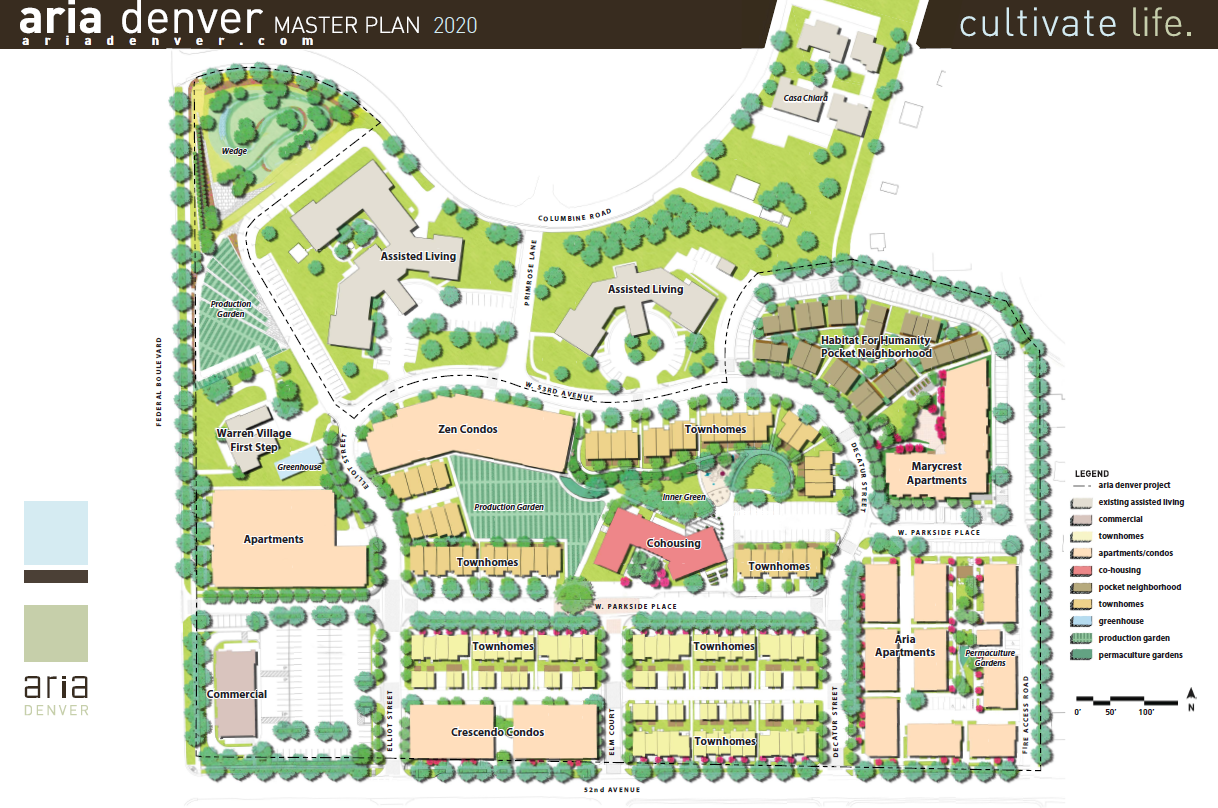 Unlike many developers, Urban Ventures engages extensively with the surrounding community from the very beginning, working to ensure that the development fits within the existing context of the neighborhood. According to Susan Powers, President of Urban Ventures, Chaffee Park did not have an active Registered Neighborhood Organization (RNO), which is the typical way developers communicate with neighborhoods in which they build. Instead, they were able to reach people by connecting with the local elementary school. Powers noted, “We didn’t have the traditional ways of reaching people in the community, so we depended on the elementary school. Schools are the center of community life.”
Unlike many developers, Urban Ventures engages extensively with the surrounding community from the very beginning, working to ensure that the development fits within the existing context of the neighborhood. According to Susan Powers, President of Urban Ventures, Chaffee Park did not have an active Registered Neighborhood Organization (RNO), which is the typical way developers communicate with neighborhoods in which they build. Instead, they were able to reach people by connecting with the local elementary school. Powers noted, “We didn’t have the traditional ways of reaching people in the community, so we depended on the elementary school. Schools are the center of community life.”
One lesson learned through these community meetings was the value residents placed on open space. With the planned redevelopment, the property would transform from mostly open space that included an apple orchard and clear views of the Rocky Mountains, to a comparatively dense, urban neighborhood. “When we started getting the feeling that people felt like they were losing something, that didn’t feel right,” Powers said. “We had to make sure we were doing something that made them feel like they were a part of what was going on and that there would be some benefits to the community. This was not a gated neighborhood but was a part of and growing out of them.” This feedback led to Aria Denver including multiple green spaces, including two pocket parks and two urban farms.
Urban Ventures also worked extensively with the Sisters of St. Francis, then-owners of the property, to ensure that the development would reflect their values and contribute positively to the surrounding neighborhood. The Sisters identified two key priorities: first, that the development would be fully integrated into the surrounding neighborhood; second, that the development would serve people of all income levels and offer housing for individuals transitioning out of homelessness, workforce housing, and market-rate housing. Powers noted, “The Sisters offered many great programs and were operating a food bank. This was a 17-acre site…it could have easily been a Costco!”
The most significant program to come out of Urban Ventures’ engagement with the surrounding community was Cultivate Health, a partnership between Urban Ventures, Regis University, and the surrounding neighborhoods. Regis already had their health science programs integrated into the neighborhood. Their physical therapy students were working at the assisted living just north of the Aria development, and other students were working in the local elementary school, Beach Court Elementary. According to Powers, “They were in the community already,” so the partnership was natural.
The goal of Cultivate Health was to support the health and wellness of residents within Aria and the surrounding community. Funded by a grant from the Colorado Health Foundation, the program included:
- A production farm operated by a local nonprofit, Frontline Farming
- Outdoor fitness equipment on site
- A Healthy Living Coordinator (funded for four years) who organized bilingual outdoor fitness and yoga activities
- Sidewalk and pedestrian infrastructure improvements to encourage walking and connect the community to nearby trails
- Free bikes and bike racks to Beach Court Elementary
- The creation of a new program at Regis University to focus on Urban Food Systems
- Cooking Matters program brought to Beach Court Elementary
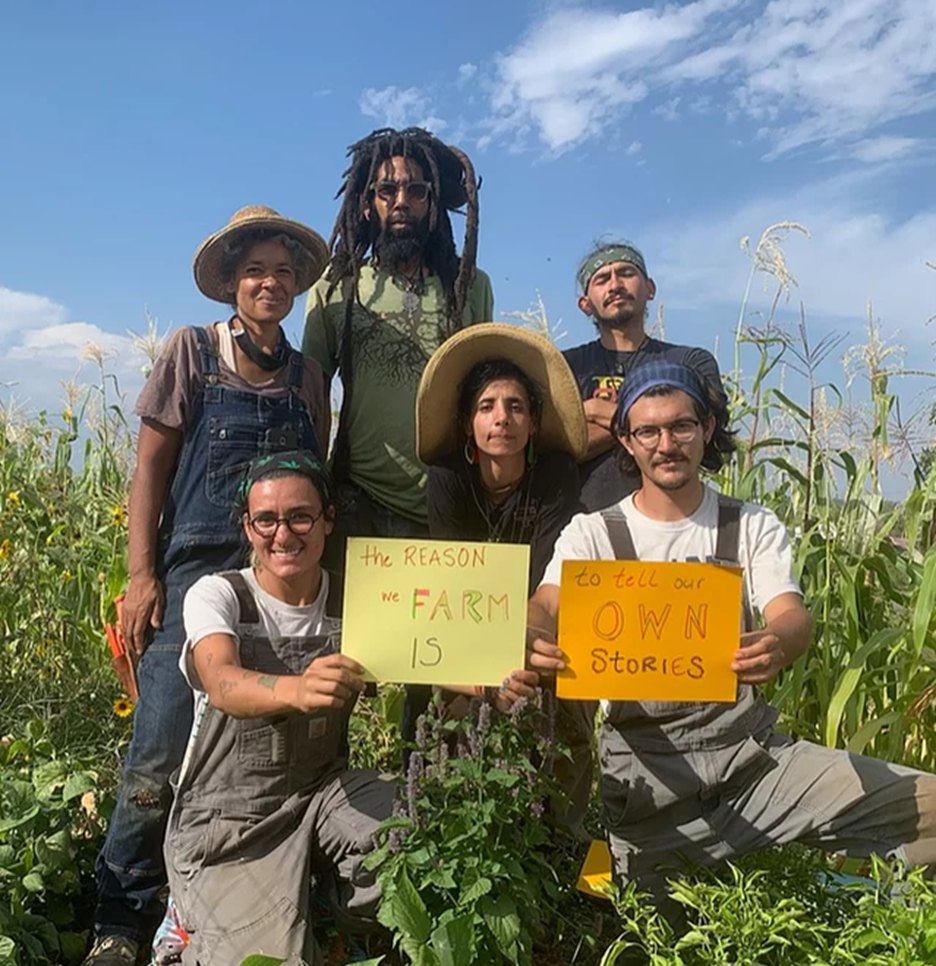
Just a few years from completion, Aria Denver includes the following:
- Market-rate for-sale housing, including condos, townhomes, and rowhomes
- A Habitat for Humanity Pocket Neighborhood with affordable for-sale workforce housing located on a Community Land Trust
- Affordable rental apartments
- A mixed-income, multi-generational cohousing community located in the former convent building
- A commercial component that includes a Starbucks and a children’s dentist office
- Warren Village First Step transitional housing for high-school aged pregnant girls
- An urban farm and greenhouse
- Green space, pocket parks, and walkable paths connecting to trails in the surrounding neighborhoods
- A playground
- Adult outdoor fitness equipment
In 2021, Wenk Associates, the landscape architect for the project, won an Honor Award from the Colorado Chapter of the American Society of Landscape Architects in the Equity, Inclusion, and Diversity category. The category recognizes projects, “built or unbuilt that focus on equity, inclusion, and diversity, with a focus on designing for social impact – projects that give voice to those who have been historically disenfranchised, marginalized, or excluded.” It is no doubt that Urban Ventures and its partners worked diligently to have a positive impact on both the neighborhood’s long-term residents as well as the new residents moving in.
STEAM on the Platte
Much like Aria Denver, STEAM on the Platte is a mixed-use development rooted in the history and culture of its surrounding neighborhoods. The development includes a 65,000 square foot repurposed rag baling facility turned into creative office space; Racies Brewing Company, Denver’s first Latino-owned and operated brewery; and land slated for future development of multifamily housing or additional office space. As with Aria Denver, Urban Ventures’ approach to development started with engaging extensively in the local community.
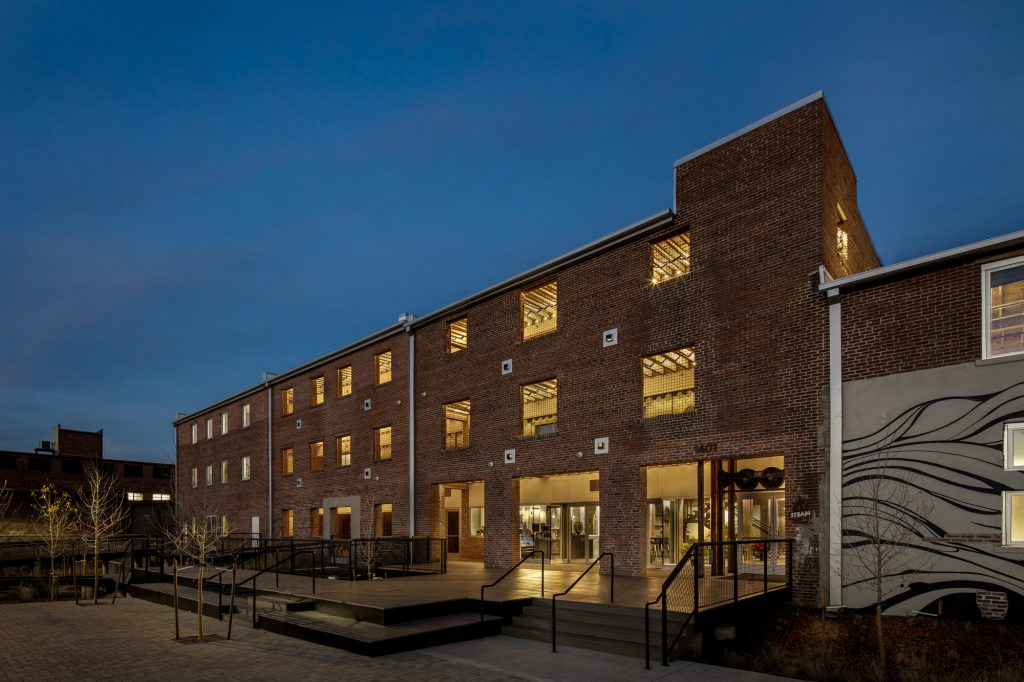 In 2016, the Denver Housing Authority and the City and County of Denver were awarded a $30 million Choice Neighborhoods Implementation Grant to redevelop the neighborhood’s public housing, the Sun Valley Homes. It also created a nonprofit entity to guide the redevelopment of the neighborhood called the Sun Valley EcoDistrict to “create a new model of community transformation, with equity, environmental justice and public health as its driving forces.”3
In 2016, the Denver Housing Authority and the City and County of Denver were awarded a $30 million Choice Neighborhoods Implementation Grant to redevelop the neighborhood’s public housing, the Sun Valley Homes. It also created a nonprofit entity to guide the redevelopment of the neighborhood called the Sun Valley EcoDistrict to “create a new model of community transformation, with equity, environmental justice and public health as its driving forces.”3
Upon learning of the redevelopment, Powers began attending community visioning meetings to learn about the values, concerns, and hopes shared by community members and leaders. When asked what drove her to this decision, she remembered the approach taken on a similar project in Denver in which she served as a development consultant: “The master planner of that neighborhood redevelopment had an anthropologist living in the public housing projects for nine months to learn about the community. So, I learned a lot about how important it is to get to know the people that are already living there.”
She quickly came to know and respect the Sun Valley neighborhood’s leaders, many of whom ran local nonprofit organizations. She started attending RNO meetings and became personally involved with the Sun Valley Youth Center, making monthly contributions, buying art from their students, and financially supporting or sponsoring community events. “The whole model of coming in, investing money, taking all the profit and leaving is an extractive way of doing development. It can’t be the future; it doesn’t have to be the future,” she noted. Urban Ventures’ approach is “to re-invest and be a part of the success of the people that are living there.”
An important component of the STEAM office building is complementing highly profitable technology companies with nonprofits serving the common good. STEAM tenants include a California-based technology company, a business management consulting firm, a construction company, an architectural firm, and a medical technology company. Yet, the building also includes a non-profit organization that offers affordable yoga and meditation classes, as well as a nonprofit electric bicycle shop that serves young adults from low income families by offering education, job skills training, and mentorship opportunities.
Another key component of STEAM on the Platte is support for minority and women-owned businesses. Bold Beans Cafe, a social enterprise of Girls Inc. of Metro Denver, a local nonprofit serving low-income girls, is located in the lobby of the STEAM office building. Bold Beans serves exclusively women-produced coffee and provides employment and entrepreneurial training to its baristas who are high-school aged participants of Girls Inc.’s programs. According to Powers, the partnership with Bold Beans is mutually beneficial. The office building doesn’t have enough tenants or receive enough foot traffic to host a Starbucks or a traditional cafe. So, in exchange for subsidized rent to Girls Inc., the building’s tenants have daily access to exceptional coffee, lunch, and service that they otherwise would not.
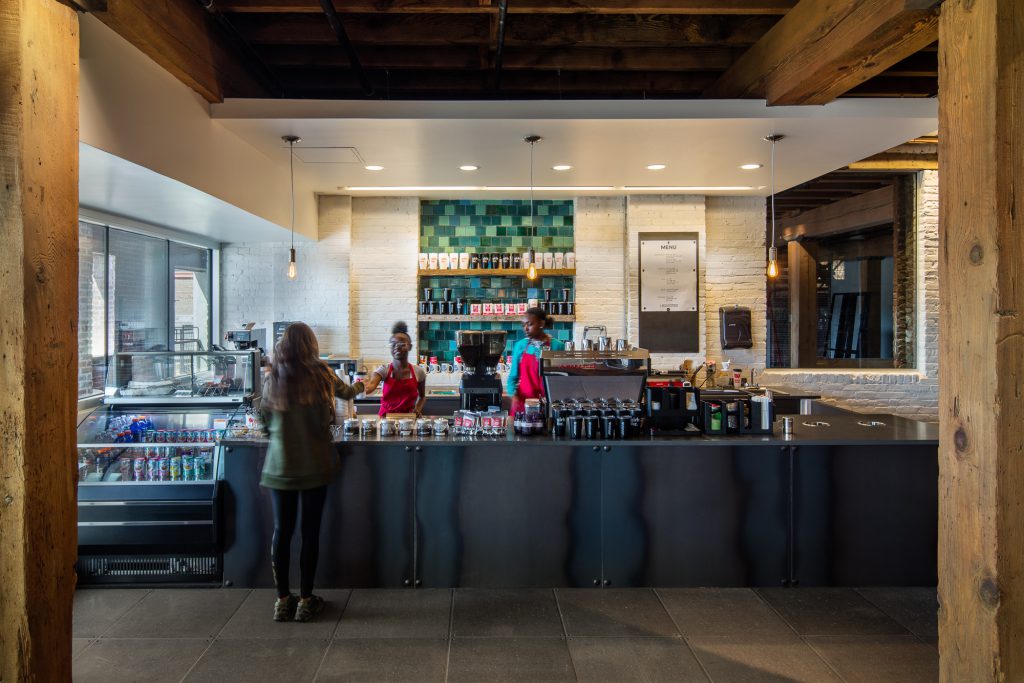
Perhaps the most notable tenant at STEAM on the Platte is Raices Brewing Company. According to their website, “For Latinos, Raices is a place to connect with other Latinos and feel at home surrounded by traditional Latin food, music, culture, and great beer. For non-Latinos, Raices is a place where, in addition to having great food, music, and beer, people can learn about Latin culture and its richness.” Raices’ programming includes a rotating selection of Latin American food trucks, bilingual karaoke, pop-up marketplaces featuring Latin American artisans and vendors, and special events celebrating Latin American holidays and traditions. Each year, Raices hosts Suave Fest, the first craft beer festival in the country celebrating Latino craft breweries, brewers, community, and culture. The three pillars of Raices are “Community, Culture, and Cerveza.”
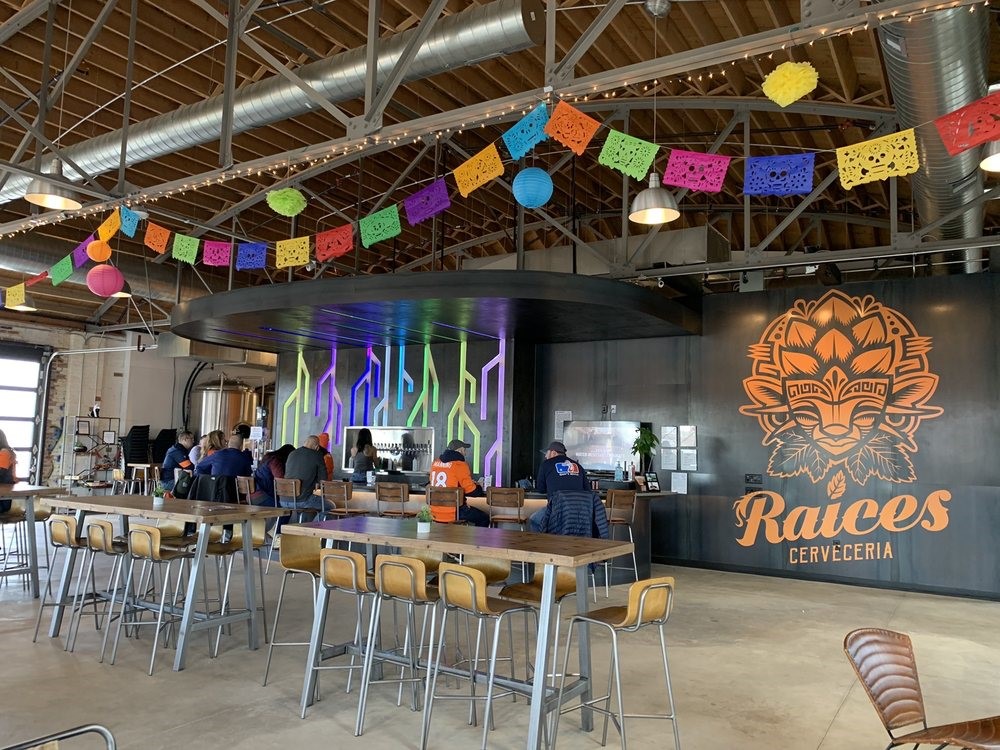 On her choice to work with Raices, a new business to Denver, rather than a more established brewery, Powers said, “I fell in love with them – with who they were, what their story was, what their vision was. It wasn’t just a brewery. We could have worked with [a more established brewery,] but they would have closed during COVID. They would have never had the kind of loyalty that Raices has now.” Urban Ventures’ support to Raices has included hands-on guidance in finding and securing financing to start their business, technical assistance during all phases of the development, rent abatement in the first year of the Coronavirus Pandemic, and support in pursuing financing to purchase the building. According to Powers, choosing Raices as a tenant “has resulted in a partnership for life.” It has also offered immeasurable cultural capital to all of west Denver, which is home to some of Denver’s largest Latino communities.
On her choice to work with Raices, a new business to Denver, rather than a more established brewery, Powers said, “I fell in love with them – with who they were, what their story was, what their vision was. It wasn’t just a brewery. We could have worked with [a more established brewery,] but they would have closed during COVID. They would have never had the kind of loyalty that Raices has now.” Urban Ventures’ support to Raices has included hands-on guidance in finding and securing financing to start their business, technical assistance during all phases of the development, rent abatement in the first year of the Coronavirus Pandemic, and support in pursuing financing to purchase the building. According to Powers, choosing Raices as a tenant “has resulted in a partnership for life.” It has also offered immeasurable cultural capital to all of west Denver, which is home to some of Denver’s largest Latino communities.
Developing Differently
When faced with the task of reinvesting in neighborhoods that carry legacies of chronic disinvestment and systemic and environmental racism, cities have an important decision to make. Not developing at all does not seem a wise – or realistic – option. Too many of our cities’ neighborhoods have subsisted with substandard infrastructure, little to no green space, minimal access to fresh or healthy food, and limited access to jobs and economic opportunity.
The question, then, doesn’t seem to be whether to redevelop, it is how to redevelop. In choosing developers to work with, local leaders, property owners, and city officials can look to companies like Urban Ventures that engage meaningfully with surrounding communities every step of the way. Companies like Urban Ventures take the long view when it comes to redevelopment, and in doing so create lasting value felt by residents of all incomes and backgrounds.
On being a woman-run company that in recent years has employed almost exclusively women employees, Powers said this: “I think it comes down to whether you’re looking at things in a short-term or a long-term way. We’re always thinking about the next generation.”
Lindsay M. Miller is a Senior Fellow at the National Civic League and Founding Principal at Beyond Growth Strategies, LLC. She worked on the development team at Urban Ventures from 2020-2021.



